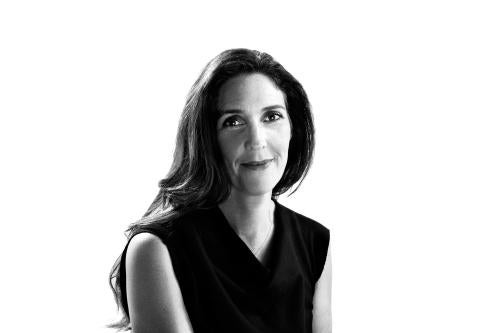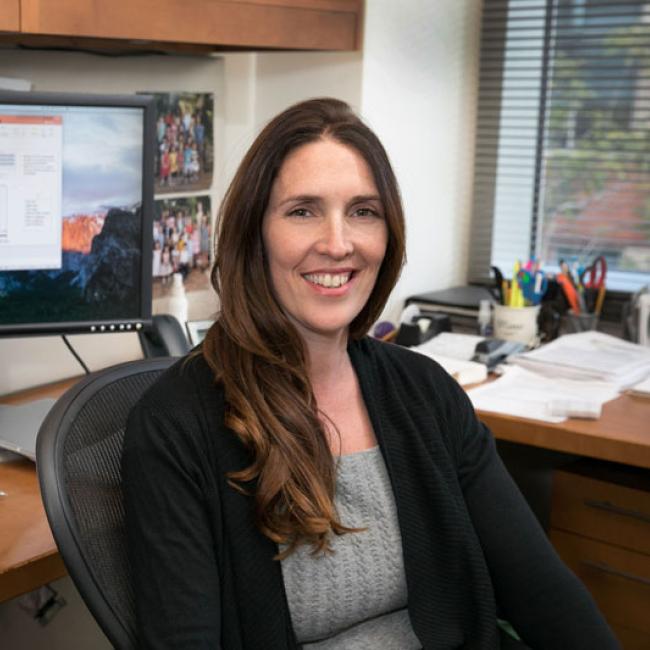
Member Spotlight: April Pyle’s journey from scientist to startup co-founder
Meet April Pyle, PhD, professor and co-founder of MyoGene Bio, a biotech company that’s developing a new gene therapy for Duchenne muscular dystrophy, a deadly genetic condition that largely affects boys. Here, she talks about how the collaborative environment at UCLA and the Eli and Edythe Broad Center of Regenerative Medicine and Stem Cell Research has helped her entrepreneurial journey, her quest to find solutions to treat complex medical conditions and her love of the outdoors.
Pyle is a professor of microbiology, immunology and molecular genetics in the UCLA College, the George and Nouhad Ayoub Centennial Chair in Life Sciences Innovation and a member of the UCLA Broad Stem Cell Research Center.
Tell us about your research.
My lab is dedicated to developing new therapies for devastating neuromuscular-wasting diseases like Duchenne, which affects one in 3,500 boys worldwide. People with the disease generally start to require the use of a wheelchair in their teens and typically die in their 20s.
There’s no currently available cure, but a gene therapy my lab is developing in collaboration with my colleagues Melissa Spencer and Courtney Young could slow disease progression and extend the lives of patients. This therapy is intended to target the primary cause of the disease by restoring a missing protein called dystrophin, which is essential for muscle function.
How has being a UCLA Broad Stem Cell Research Center member helped you as a scientist?
The Broad Stem Cell Research Center is one of the premiere stem cell centers in the world, in large part due to the collaborative nature of the scientists here at UCLA. Working with cutting-edge researchers who freely share their knowledge and expertise has been invaluable—it’s really an environment where everyone can excel.
One example of this collaborative spirit in action is an ongoing partnership we have with the lab of Melissa Spencer, a fellow Center member. Melissa and I shared a graduate student, Courtney Young, who developed a CRISPR gene editing platform. Together, the three of us founded a biotech startup called MyoGene Bio in an effort to quickly advance this discovery to the clinic so patients can benefit. A recent grant from the California Institute for Regenerative Medicine is helping our team evaluate the safety and efficacy of our gene editing platform in large animal models of Duchenne, and our goal is to launch a clinical trial with human participants in the next five years.
A story like MyoGene’s would only be feasible in a few places. The environment at UCLA, and in particular, the Broad Stem Cell Research Center, has really enabled us to go from a basic, innovative idea to these early preclinical studies. There are also pipelines and mentors in place here to build the partnerships necessary to move early discoveries towards the clinic.
Have you always wanted to be a scientist?
I wouldn't say I’ve always wanted to be a scientist, but I was always a very curious kid. My passion for science developed over time thanks to several amazing scientists who’ve guided me to the exciting questions that my lab works on today.
In fact, the CRISPR gene editing strategy we developed is the result of this out-of-the-box thinking that my advisers encouraged. Our approach removes a hotspot in the genome where Duchenne mutations typically appear. This is counterintuitive, right? Most people want to deliver a new healthy copy of the faulty gene, but we’re actually cutting out a hotspot region. Had I not had such strong mentors along the way who pushed me to try these innovative approaches, we wouldn't be here today.
What motivates you to pursue your research?
My quest to find answers to some of the most complex medical questions is what drives me forward every day. When I first started out in the field, it wasn't even clear whether there would be federal funding to do the science that I wanted to do. I remember my mom saying, “Are you crazy? There isn’t even funding to do stem cell research.” Thankfully, the California Institute for Regenerative Medicine was created in 2004 after voters authorized billions in funding for stem cell research. This seminal decision provided the critical source of state funding that my colleagues and I rely on today.
Where and when are you the happiest?
In the lab, I'm happiest interfacing with students and postdocs and really thinking through their questions and challenging them to analyze their data on a higher level. That's when I'm most excited—seeing the data in action.
Outside of work, I'm happiest when I’m with my 10-year-old son, Lucas, who always keeps me on my toes. He’s a soccer star, a talented chef and he knows way more than I do about all things… not science related.
What’s something about you most people might not know?
Being outdoors is my favorite way to reset. I love hiking, going to the beach and I’m also very into snowboarding. Now that I’m in Los Angeles, I go to Mammoth Mountain a few times a year, but my all-time favorite place to snowboard is Whistler Mountain in Canada.
